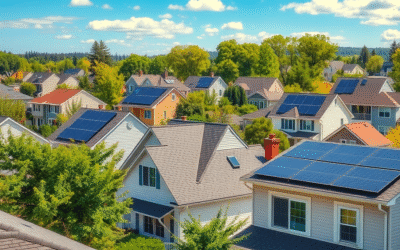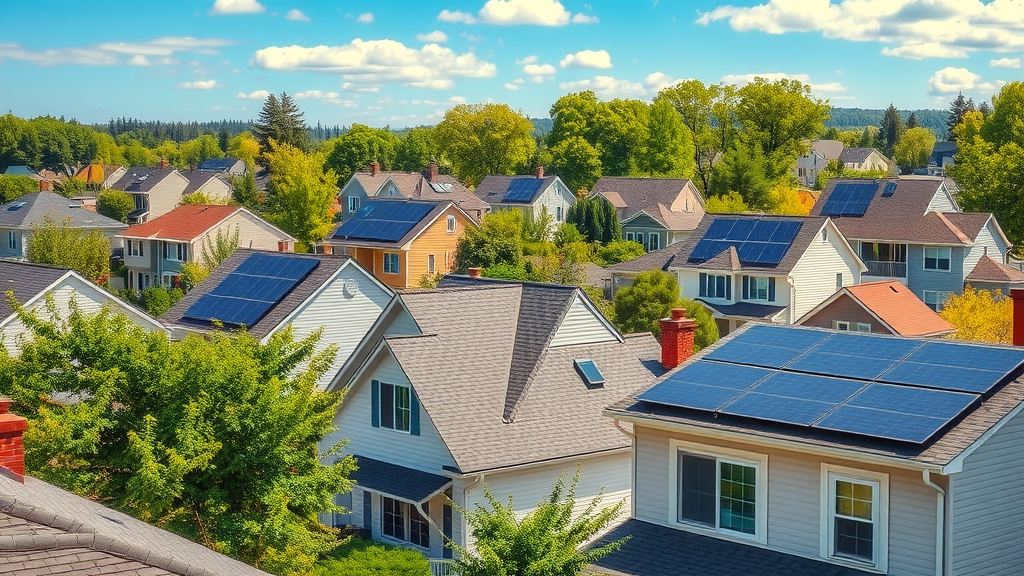Did you know New Jersey ranks in the top 10 states for solar installations, yet most homeowners still overestimate the residential solar panel cost NJ by 30%? If the sticker price has made you hesitate, it’s time to dig into the real numbers and the extraordinary returns. Going solar in New Jersey isn’t just for the eco-conscious — it’s a smart, affordable way to shield your family from rising utility bills, benefit from major tax credits, and invest in your home’s long-term value. This comprehensive guide breaks down facts versus myths, gives you actionable savings insights, and empowers you to make a savvy energy decision for your home.
The Real Story Behind Residential Solar Panel Cost NJ: Eye-Opening Facts & Myths
-
Discover surprising statistics on solar panels in New Jersey and learn why residential solar panel cost NJ is more accessible than many homeowners realize.
It’s a common misconception that residential solar panel cost NJ is out of reach for the average homeowner. In reality, the cost of solar panels in New Jersey has dropped over 50% in the last decade. That means, for many families, monthly payments to finance a modern solar system can be on par with — or even less than — their regular electric bill. New Jersey also offers generous solar tax incentives, making the initial investment significantly more manageable.
Let’s cut through persistent misconceptions: costly upfront payments, maintenance headaches, and complicated regulations are relics of the past. Today’s solar companies in NJ provide streamlined, transparent installation processes and innovative financing options tailored to different home and budget sizes. Pair that with state and federal programs like the federal solar tax credit , and you’ll see why thousands have already made the shift toward clean energy — and major savings.
What You’ll Discover About Residential Solar Panel Cost NJ
-
Key factors that determine residential solar panel cost NJ
-
Real numbers: average cost of solar panel systems in New Jersey
-
Available solar incentives, including tax credit for solar panels
-
Long-term savings and ROI analysis
-
Tips for selecting the right solar installation and solar companies
By the end of this article, you’ll understand the most critical cost of solar factors, see up-to-date pricing examples, master the essentials of the federal solar tax credit , and learn strategies to maximize your investment. You’ll also be guided on how to compare solar companies, understand the components included in a typical solar panel system quote, and discover insider tips to ensure your solar journey in New Jersey is both affordable and rewarding.
Whether you’re looking to power a modest Cape Cod or a sprawling colonial, you’ll find that panels in New Jersey are achievable, with clear data on payback periods, incentives, and long-term clean energy benefits. Let’s explore the nuts and bolts so you can confidently make the transition to solar power.
Understanding Residential Solar Panel Cost NJ: Key Terminology and Components
Defining the Main Factors: Solar Panel, Solar System, and Installation Cost
-
What is included in ‘residential solar panel cost NJ’?
-
Solar panel system vs. solar panel: understanding your options
-
System size, installation cost, and how solar companies in NJ price projects
When considering residential solar panel cost NJ, it’s important to understand what you’re actually paying for. The total cost typically consists of three core components: the panels themselves , the solar system equipment (inverters, racking, monitoring system), and the installation cost . Many homeowners mistakenly think the panels are the majority of the cost, but professional solar installation and electrical work can represent a significant portion, especially for complex roof layouts or older homes.
A “solar panel system” includes more than just the visible modules on your roof. It covers the system size (measured in kilowatts or kW), which should match your household’s average energy use, and supportive equipment that guarantees your system is safe, code-compliant, and delivers reliable energy. Solar companies in NJ consider local permitting fees, your home’s layout, and the technology you select when preparing an estimate. Getting clear, itemized quotes is crucial for comparing providers and understanding the value you’re receiving.
How Panels in New Jersey Differ: Local Market Insights
-
Panels in New Jersey: types, quality, and availability
-
Solar installation trends unique to NJ homeowners
Panels in New Jersey stand out for their diversity and quality. New Jersey’s popularity as a solar state means homeowners can choose from a wide array of options: high-efficiency monocrystalline panels, reliable polycrystalline technology, and even advanced microinverter solutions. Solar installation companies in NJ often source equipment from both domestic and international manufacturers, ensuring the supply chain remains robust and competitive.
Local installation trends also matter. Many NJ homeowners value aesthetic integration, choosing all-black panels or low-profile mounting for homes in HOA communities. Likewise, several solar companies have adapted their offerings to maximize production in areas with tall trees, weather variations, and roof orientation challenges unique to the Northeast. This flexibility benefits consumers, driving down the overall cost of solar through healthy competition and tailored solutions.
Breakdown of Average Cost of Solar Panels in New Jersey
Average Cost of Residential Solar Panel System NJ: Detailed Data
|
Average Residential Solar Panel Cost NJ by System Size, Panel Quality, and Typical Household Usage (2024) |
||||
|
System Size (kW) |
Low-End Cost ($) |
High-End Cost ($) |
Panel Quality |
Annual Usage (kWh) |
|---|---|---|---|---|
|
4 kW |
9,500 |
12,000 |
Standard |
5,000-6,000 |
|
6 kW |
12,500 |
16,000 |
High-Efficiency |
8,000-9,500 |
|
8 kW |
17,500 |
21,000 |
Premium |
10,000-12,000 |
|
10 kW |
20,000 |
25,000 |
Premium Plus |
12,000-15,000 |
The average cost of a residential solar panel system NJ depends on your energy needs and panel type. For most New Jersey households, expect to pay between $12,000 and $21,000 for a system that covers average usage. After applying the 30% federal solar tax credit, the net range can dip as low as $8,400–$14,700. Larger or high-consumption homes may require a 10 kW system, pushing costs closer to the $25,000 mark before incentives — but yielding the highest long-term savings in electricity bills.
Panel quality impacts not just performance and durability, but also warranty coverage and aesthetic appeal. Higher-end systems offer improved efficiency, which can be critical if you have limited roof space or want to maximize production for net metering credits. Always match system size to your household’s historical annual usage for a tailored fit and optimal return on investment.
Typical Installation Cost: What to Expect from Solar Companies
-
Installation cost breakdown for a variety of homes in New Jersey
-
Factors that increase or decrease installation costs
New Jersey’s diverse housing stock means installation costs vary. For a typical 2,000 sq. ft. home with a good sun-exposed roof, installation costs often represent approximately 15%–25% of the overall project, typically $2,500–$5,500 based on labor, local permitting, and system complexity. Historic homes, steep roof slopes, or multi-level surfaces can raise prices due to added equipment and safety measures.
What decreases your installation cost? Simpler roofs, homes wired for modern electrical codes, and proximity to solar company operations all lead to lower bids. The most transparent solar companies in NJ will clearly outline line-item costs, including hardware, labor, and permitting, letting you make apples-to-apples comparisons when reviewing proposals.
Factors That Impact Residential Solar Panel Cost NJ
System Size, Panel Efficiency, and Solar Panel Quality
One of the largest drivers of residential solar panel cost NJ is system size . Think of system size as the number of panels multiplied by the wattage of each, matching your home’s unique energy profile. Installing a system that’s too small leaves you reliant on grid power, while an oversized array can send excess unused power back — better for net metering, but an unnecessary extra upfront.
Panel efficiency and solar panel quality also weigh heavily on price. Top-tier panels convert more sunlight into power, require less roof space, and provide longer warranty coverage (often 25+ years). While higher upfront, these systems deliver lower cost per kilowatt-hour produced and have greater value over time. Value-focused buyers may choose mid-range panels to blend cost and long-term performance, while tech enthusiasts and those with small roofs often go premium for maximum efficiency.
Solar Installation Choices: Roof Type, Location, and Local Labor Costs
-
System size considerations for 2,000 sq. ft. homes
-
Roof orientation and shading
-
How solar companies assess unique property features
Everything from your roof’s angle to neighborhood trees impacts installation cost and system design. South-facing roofs get more sun, requiring less total panel power for the same output, while shaded or complex roofs (multiple pitches, dormers) may require innovative mounting that adds to labor hours. The footprint of a 2,000 sq. ft. home usually supports a 6–8 kW system, enough for most families, but a site visit by a trusted solar company will confirm your true needs.
Local labor costs and permit fees further influence final pricing. Urban, high-demand areas may see slightly higher costs due to specialist labor and faster turnaround, whereas rural homes might pay travel premiums. Detailed site assessments ensure you receive a system tailored for both optimal output and value.
Making Solar Affordable: Solar Incentive and Tax Credit in NJ
Federal Solar Tax Credit: How the 30% Tax Credit Works for NJ Homeowners
One of the most significant drivers reducing residential solar panel cost NJ is the federal solar tax credit , also known as the Investment Tax Credit (ITC). Homeowners who install a qualifying system can claim 30% of the total system cost — panels, inverters, labor, permitting, even energy storage — as a dollar-for-dollar credit against what you owe in taxes for the year the system is installed. For a $20,000 system, that’s a $6,000 reduction, meaning you only pay $14,000 net. Most buyers complete simple paperwork with their tax forms (IRS Form 5695), often with professional help or software, making the process fast and straightforward.
This credit is currently extended through 2032, meaning there’s never been a better time to invest. Don’t confuse it with a deduction; a tax credit covers your tax liability directly and can even roll over portions of unused credits to the following year.
NJ State-Specific Solar Incentives: SREC, Net Metering & More
-
Net metering explained: How you earn from excess power
-
State and local rebates for residential solar panel cost NJ
Alongside federal incentives, New Jersey offers some of the country’s best local programs. Net metering allows you to send excess power back into the grid, earning credits to offset future utility bills — a major bonus during sunny summer months. The state’s new Successor Solar Incentive (SuSI) program pays cash for every megawatt-hour generated, turning your solar system into a mini power plant. Some towns and utilities even provide upfront rebates or expedited permitting to encourage adoption.
Stacking state and federal benefits makes solar panel systems approachable for most budgets. Homeowners can even participate in community solar or choose a power purchase agreement (PPA) if upfront ownership isn’t ideal, locking in lower, predictable rates for the long term.
Comparing Solar Companies in New Jersey: Price, Quality, and Customer Reviews
-
Top-rated solar companies for residential installations
-
Price transparency and warranties: What to look for
-
Customer testimonials: Real experiences
Choosing among solar companies in New Jersey is as important as selecting your equipment. Look for firms with established track records, proper state licensing, and third-party customer feedback. Top installers will transparently display pricing tiers, warranty terms (equipment and workmanship), and explain how their process minimizes interruption to your daily life. Don’t be swayed only by ultra-low bids; reputable solar companies price projects to include post-installation support and robust warranty coverage.
Many New Jersey homeowners opt for companies offering strong local presence, which means faster service, more responsive support, and access to local incentives. Customer testimonials can reveal details about project management, communication, and long-term satisfaction. A sample review:
“Switching to solar panels in New Jersey cut my electricity bill by 80% — and the federal solar tax credit covered nearly a third of the installation.” – New Jersey Homeowner
Return on Investment: Long-Term Savings When You Pay Residential Solar Panel Cost NJ
ROI Calculations & Payback Periods for Panels in New Jersey
|
Estimated Payback Period for NJ Solar Panel Systems vs. Utility Costs |
|||
|
System Size |
Total Cost After Tax Credit ($) |
Annual Electricity Savings ($) |
Estimated Payback Period (Years) |
|---|---|---|---|
|
6 kW |
11,900 |
1,700 |
6.5–7.5 |
|
8 kW |
15,400 |
2,200 |
7–8 |
|
10 kW |
17,500 |
2,700 |
6.5–7.5 |
Most NJ homeowners see 6–8 year payback periods depending on system size, electric prices, and solar incentives. These calculations factor in current rates, conservative inflation, and all maintenance costs. Once your system is paid off, you benefit from virtually free energy and income from SREC/SuSI credits, while your home’s value rises. This return on investment (ROI) routinely outperforms stock market averages and is protected from energy price volatility.
Some buyers choose to invest in higher efficiency panels for faster payback, while others adjust for future electric vehicle charging or home additions. A clear, customized ROI analysis should be included in all competitive solar proposals.
How Renewable Energy Incentives Influence Savings
-
Renewable energy credits
-
Lifetime energy savings vs. upfront investment
New Jersey’s renewable energy incentives aren’t just about upfront rebates. SREC and SuSI credits create ongoing additional income. Coupled with lifetime energy savings — often totaling $40,000–$60,000 over 25 years — it’s clear that residential solar panel cost NJ is an investment with compounding rewards. Renewable energy systems not only insulate you from rising utility rates, but also increase resiliency and energy independence.
Many homeowners choose to reinvest incentives or annual savings into home upgrades or college funds, turning a monthly energy expense into long-term financial growth. Every kilowatt-hour of clean, solar power generated is both an environmental and economic win.
Checklist: Steps to Get the Best Deal on Residential Solar Panel Cost NJ
-
Evaluate your home’s solar potential
-
Compare multiple solar companies
-
Review installation cost quotes
-
Check for all available solar incentive programs
To secure the best cost of solar panels for your NJ home, start by using an online calculator or scheduling a site visit to assess your solar potential. Next, obtain detailed quotes from at least three solar companies, making sure each outlines hardware quality, system size, warranties, and installation costs. Scrutinize the fine print: good contracts spell out contingency plans for roof repairs, performance guarantees, and escalation clauses.
Don’t leave money on the table — research every possible solar incentive at the federal, state, and utility level. Professional installers often help with paperwork, but a little homework ensures no opportunity is missed. Getting informed now helps you lock in today’s historically low installation costs and maximize return on your solar investment for years to come.
Animated explainer: Breaks down each cost component (panels, installation, incentives) to demystify residential solar panel cost NJ for homeowners.
People Also Ask: How much do solar panels cost for a 2000 square foot house in NJ?
Actual Cost Ranges for Residential Solar Panel System Size and Installation
For a 2,000 square foot New Jersey home, the average cost of solar panel system NJ ranges from $14,000 to $19,000 before incentives for a 6–8 kW system. After the 30% federal solar tax credit , the net price falls to approximately $10,000–$13,300. Prices vary based on panel efficiency, roof complexity, and specific installation company overhead. This system typically covers most or all of a home’s yearly electricity needs, especially when paired with the state’s strong net metering program.
Requesting multiple bids and reviewing what’s included in each (monitoring, warranties, storage) ensures you receive the best overall value for your investment. Don’t forget — future SREC/SuSI payments, energy savings, and increased home value sweeten the deal even further.
People Also Ask: Is it worth getting solar panels in NJ?
Evaluating Return on Investment, Net Metering, and Incentives
Absolutely — New Jersey is one of the most favorable states for solar adoption. With electricity rates above the national average, robust net metering rules, and valuable state/federal incentives, homeowners can often recoup their investment within 6–8 years and enjoy decades of free power. SREC/SuSI credits and rising property values provide additional returns. If your roof is structurally sound and receives adequate sunlight, the financial and environmental benefits far outweigh the initial residential solar panel cost NJ .
It’s essential to evaluate your site’s shading and orientation, as these factors impact production and speed up ROI. For most, the answer is a resounding yes — both for household budgets and the planet.
People Also Ask: How much is it to install solar panels in NJ?
Typical Installation Cost and Influencing Factors
Installation cost in New Jersey is typically $2,500 to $5,500 for residential projects, depending on your roof’s complexity, labor rates, and permitting fees. This cost includes site evaluation, design, permitting, labor, racking, and final inspections. Installation may be bundled into a single project quote or broken out as a line item, so clarify with your installer to ensure apples-to-apples comparisons.
Upgrades for older electrical panels, structural supports, or specialized equipment may add to this range. Experienced solar companies will perform a free site assessment and give you a precise, itemized bid before you commit.
People Also Ask: How much is a solar system for a 2000 sq ft house?
Average Cost of Solar System for 2,000 sq ft Homes in New Jersey
A typical 2,000 square foot home in New Jersey requires a 6–8 kW system, with average cost estimates running $14,000–$19,000 before tax incentives ($10,000–$13,300 after the ITC). These systems generally generate 7,000 to 10,000 kWh per year, meeting or exceeding most family usage profiles. Final price is influenced by roof angle, shingle type, and panel technology preference, but certified installers will work with you to fit the system within your budget and maximize savings through incentives and financing.
The investment pays for itself within a decade in most cases, with ongoing, predictable savings locking in your household against ever-increasing utility costs.
FAQs on Residential Solar Panel Cost NJ, Tax Credits & Solar Panels
What are the maintenance costs for solar panels in New Jersey?
Solar panel maintenance costs in New Jersey are minimal, typically $150–$300 a year for professional inspections and occasional cleaning. Most modern systems are nearly maintenance-free and come with 20–25 year warranties against defects. If needed, inverter replacement (usually after 10–15 years) is the only significant lifecycle expense. Insurance may also cover storm damage, reducing potential out-of-pocket costs for repairs.
Can I combine federal solar tax credit with NJ incentives?
Yes! Homeowners can combine the federal solar tax credit (30% off total installation cost) with NJ’s state incentives, such as SREC/SuSI credits, local rebates, and net metering. This “stacking” approach significantly reduces out-of-pocket expenses and delivers additional cash flow through credits or rebates from state programs — making solar more accessible and budget-friendly for New Jerseyans.
How long do residential solar panels last in New Jersey’s climate?
High-quality residential solar panels in New Jersey are designed to last 25–30 years or more, even with Northeast weather extremes. Most panels come with performance guarantees ensuring they’ll produce at least 80% of their rated output after 25 years. Regular light cleaning and annual checks ensure peak. Many systems continue functioning at reduced capacity well beyond their guarantee period, delivering decades of clean energy.
Key Takeaways: Residential Solar Panel Cost NJ & Smart Investing
-
Solar panels in New Jersey are more affordable with incentives
-
Upfront installation cost is reduced by federal and state programs
-
Long-term savings often outweigh initial residential solar panel cost NJ
Get Started: Expert Help with Residential Solar Panel Cost NJ
-
Find NJ’s Trusted Home Experts — Fast and Reliable Service at Your Fingertips www.njhomesexperts.com
Video guide: What to look for in a New Jersey solar installer — from licenses and reviews to warranty details and customer support.
New Jersey ranks among the top states for solar installations, yet many homeowners overestimate the cost of residential solar panels by approximately 30%. In reality, the average cost for a 5 kW solar panel system in New Jersey is about $13,096 before incentives, which drops to approximately $9,167 after applying the 30% federal tax credit. ( energysage.com ) This makes solar energy a more affordable and smart investment for homeowners looking to reduce utility bills and increase their property’s value.
The total cost of a residential solar panel system in New Jersey typically includes the panels, inverters, racking, monitoring systems, and installation labor. Installation costs can vary based on factors such as roof complexity, local labor rates, and permitting fees. For instance, a 6 kW system may cost around $15,716 before incentives, with installation expenses representing approximately 15%–25% of the overall project cost. ( energysage.com )
New Jersey offers several incentives to make solar installations more accessible. The federal solar tax credit allows homeowners to deduct 30% of the installation cost from their federal taxes. Additionally, New Jersey’s Successor Solar Incentive (SuSI) Program provides payments for every megawatt-hour of electricity generated by your system. Net metering policies enable homeowners to earn credits for excess energy produced, further enhancing the financial benefits of going solar. ( energysage.com )
When considering solar panel installation, it’s essential to evaluate your home’s energy needs, roof characteristics, and available incentives. Consulting with reputable solar companies can provide tailored estimates and help you navigate the various financing options, ensuring a cost-effective and efficient transition to solar energy.







0 Comments